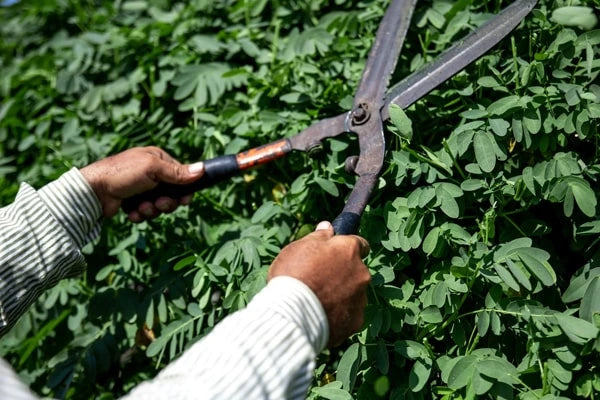Gardening isn’t just a hobby; it’s a journey of nurturing and growth. As we step into 2024, we can set powerful resolutions to improve our gardening journeys and cultivate our own green spaces to thrive.
Let’s make 2024 the year of gardening! In this guide, we list 12 gardening resolutions that will elevate your gardening game in the upcoming year.
Contents []
Best Gardening New Year’s Resolutions
-
Embrace Sustainable Gardening Practices
Grow Your Own Food
Create a Wildlife-Friendly Garden
Learn About Soil Health
Experiment with New Plants
Dedicate Time to Garden Maintenance
Share Your Gardening Knowledge
Create a Year-Round Garden
Practice Organic Pest Management
Keep Garden Records
Add More Local Plants
Nurture Your Mental Well-Being
Best Gardening New Year’s Resolutions
Every year, we reflect on the past and make plans for the future, and this year will be no exception. It’s the beginning of an opportunity to put your best foot forwards. Take a look at these 12 gardening resolutions you can do to produce a beautiful harvest in 2024!
Embrace Sustainable Gardening Practices
As you cultivate your plants, remember that each eco-conscious decision you make, whether using native plants, avoiding harmful pesticides, or nurturing a diverse range of species, plays a role in creating a more sustainable and vibrant outdoor space. Through sustainable gardening, you can foster a deeper connection with nature and sowing the seeds of a brighter, greener future.
Commit to practices that reduce your environmental footprint, such as composting, mulching, and using organic fertilizers. Reduce water waste by investing in drip irrigation systems and rain barrels. By prioritizing sustainability, you contribute to a healthier planet.
Grow Your Own Food

Growing your own food is a transformative journey that allows you to take control of what you eat. Whether you have a small balcony, a backyard garden, or even just a few pots on a sunny windowsill, you can cultivate a variety of fruits, vegetables, and herbs that nourish both your body and soul.
An edible garden offers a multitude of benefits. For one thing, it ensures access to fresh, organic produce, reducing your reliance on store-bought items that may contain pesticides or preservatives. You gain a newfound appreciation for the seasons as you savor the flavors of homegrown crops at their peak ripeness.
It also minimizes the carbon footprint associated with food transportation and packaging. Growing your own food connects you directly to the source of your sustenance, fostering a sense of responsibility for the environment and a deeper understanding of the cycles of life.
Create a Wildlife-Friendly Garden

A wildlife-friendly garden is a sanctuary for birds, bees, butterflies, and other creatures. By selecting native plants and creating habitats that mimic natural environments, you can attract and sustain various species. Bird feeders, birdhouses, and butterfly-friendly flowers contribute to the welcoming environment. Additionally, avoiding the use of harmful pesticides and opting for organic pest control methods helps protect the insects that are essential for pollination.
The presence of wildlife adds a new layer of beauty and dynamism to your garden, making it a source of joy and wonder for you and your family. Also, creating a wildlife-friendly garden is an essential contribution to conservation efforts. As urbanization encroaches on natural habitats, gardens play an increasingly critical role in providing safe havens for wildlife.
Learn About Soil Health
Learning how to achieve and maintain excellent soil health helps create the ideal conditions for plant growth. Start by testing your soil’s pH and nutrient levels, which provides valuable insights into its composition and needs. It’s important to keep looking for ways to improve soil health so you can make informed decisions about soil amendments, such as adding compost, organic matter, or specific nutrients to optimize plant growth.
Soil health extends beyond plant nutrition. Healthy soil teems with beneficial microorganisms that promote nutrient cycling and disease resistance. By learning about these intricate soil ecosystems, you can develop practices that nurture the living organisms in your soil, creating a self-sustaining and resilient environment for your plants.
Understanding soil health is not just about reaping immediate rewards; it’s an investment in the long-term vitality of your garden. Healthy soil retains moisture more effectively, reducing the need for frequent watering and providing a stable foundation for plants to establish robust root systems.
Experiment with New Plants
Stepping out of your comfort zone and trying new plants is a wonderful way to expand your horticultural horizons. Whether it’s unique flower varieties, exotic vegetables, or herbs with novel flavors, embracing new additions to your garden opens up a world of possibilities. It allows you to explore different colors, shapes, and scents, enriching the visual and sensory appeal of your outdoor oasis.
Experimenting with new plants fosters a deeper understanding of your local climate and soil conditions. It encourages you to research and learn about the specific needs of each plant, enhancing your gardening knowledge and skills. You may discover plants that thrive in your region but were previously unknown to you, contributing to a more resilient and sustainable garden.
Dedicate Time to Garden Maintenance

Gardening isn’t something you set and forget – it requires ongoing care, so you must commit to a regular maintenance schedule.
Regular maintenance such as weeding, pruning, and deadheading spent blooms ensure proper soil health. These seemingly routine chores are the backbone of a thriving garden. Weeding, for example, prevents unwanted plants from competing for resources and ensures your chosen plants can flourish. Pruning and deadheading not only maintain the garden’s aesthetics but also encourage new growth and flowering.
By dedicating time to garden maintenance, you create a space that continually rewards your efforts with vibrant colors, lush foliage, and healthy plants. It’s an investment in the long-term well-being of your garden, sparing you from major overhauls and challenges down the road.
And don’t forget, tending to your garden offers more than just physical benefits. It provides a tranquil escape from the stresses of daily life, fostering mental well-being and relaxation. The connection to nature and the satisfaction of nurturing life can be deeply therapeutic.
Share Your Gardening Knowledge
Sharing your gardening knowledge is a terrific way to connect with others who share your passion. Whether you’re a seasoned gardener with years of experience or a beginner who’s just discovered the joys of cultivating plants, your insights, tips, and experiences can inspire and educate those around you. Consider organizing community workshops or joining gardening clubs to foster a sense of camaraderie and mutual learning.
Social media and online platforms offer an excellent avenue for sharing your gardening journey with a broader audience. Whether through blogs, YouTube channels, or social media posts, your experiences can reach and inspire people worldwide. Your successes, challenges, and the beauty of your garden can serve as a source of motivation and guidance for others in their gardening endeavors.
Create a Year-Round Garden
A year-round garden is a dynamic and ever-evolving masterpiece that showcases the beauty of nature’s cycles. By carefully selecting various plants, trees, and shrubs that offer interest in different seasons, you ensure that your garden remains a vibrant tapestry of colors, textures, and scents throughout the year.
From the first blooms of spring to the rich hues of autumn and the serene greenery of winter, each season brings its own unique charm to your outdoor oasis. And no matter the weather, your outdoor space can become a sanctuary for wildlife – offering food and shelter when needed most. By cultivating a garden that supports biodiversity in all seasons, you can contribute to the overall health of your local ecosystem.
Practice Organic Pest Management
Organic pest management is a sustainable and eco-friendly approach to controlling pests in your garden or on your crops. It prioritizes using natural, non-toxic methods to keep pest populations in check while minimizing environmental harm and increasing the population of beneficial insects in the garden.
Sustainable pest management practices benefit not only your immediate environment but also the broader ecosystem, promoting biodiversity and reducing the need for chemical interventions.
Methods such as companion planting, crop rotation, and going chemical-free are some ways to control pests and restore the balance of your garden’s ecosystem. Introducing natural predators and employing physical barriers to protect your plants could also stave off nibbling insects that could wreak havoc in the garden.
Keep Garden Records
Keeping garden records is a valuable practice for gardeners, as it serves as a window into the past, a guide for the present, and a roadmap for the future. These records go beyond mere documentation; they are a garden journal that captures the essence of your gardening journey – your past experiences, successes and setbacks.
Garden records offer insights into the evolving story of your garden. They enable you to observe the dynamic nature of your plants, soil, and climate. Through journals, you can observe the changing seasons, the success of certain plant varieties, and the challenges posed by pests or diseases.
By updating your garden records, you can make informed decisions about planting, tending, and harvesting. By tracking the performance of different plants, you can tailor your garden to suit your local conditions and your preferences.
Add More Local Plants
Local plants are those indigenous to your region, offering many advantages for your garden and the broader environment.
By incorporating local plants into your garden, you are also supporting local ecosystems. These plants are often critical for native wildlife, providing essential food and shelter. Their presence can attract pollinators, birds, and other beneficial creatures, contributing to a more biodiverse and resilient garden.
What’s more, local plants are more likely to thrive without the need for excessive watering, fertilizers, or pesticides. This aligns with sustainable gardening practices, reducing the environmental impact of your garden.
Nurture Your Mental Well-Being
The beauty of a garden can lift one’s spirits and provide solace during difficult times. Cultivating a garden, whether it be a small urban space or a vast rural landscape, allows individuals to express their creativity, transforming a blank canvas into a living work of art. This creative outlet serves as an emotional release and source of satisfaction.
The act of planting, weeding, or harvesting becomes a form of meditation, reducing stress and promoting relaxation. The therapeutic benefits of gardening are well-documented, with the physical activity releasing endorphins and fostering a sense of accomplishment.
Gardening is not just about growing plants; it’s about cultivating a sustainable and joyful relationship with the earth. By embracing these resolutions, you can embark on a fulfilling gardening journey that yields not only beautiful blooms and delicious harvests but also a sense of purpose and harmony with the natural world.



